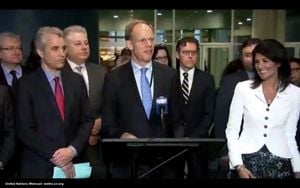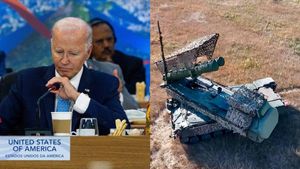President-elect Donald Trump has selected Chris Wright, the CEO of Liberty Energy, as his nominee for secretary of the Department of Energy, sparking mixed reactions across the political and environmental spectrum. Wright's nomination aligns closely with the interests of the fossil fuel industry, as he has been vocal about his support for oil and gas, often downplaying the significance of climate change and the urgency of transitioning to renewable energy sources.
Wright, who leads one of the major players in the fracking sector, has repeatedly stated his belief there is no current climate crisis, insisting, "we're not in the midst of an energy transition either." This stance resonates with many who support traditional energy practices but stands starkly against the overwhelming scientific consensus on climate change and its impacts. During his tenure at Liberty, he has opposed policies aimed at reducing reliance on fossil fuels, arguing they do more harm by inflaming energy prices.
Environmental activists and some lawmakers have voiced serious concerns about Wright's nomination. The critique highlights his history of dismissing the connection between climate change and extreme weather events, including hurricanes and droughts. Wright has claimed we have seen no increase in the intensity of such storms, even as the scientific community reports otherwise. His views sharply contradict findings from reputable organizations like the United Nations’ Intergovernmental Panel on Climate Change (IPCC) and NASA, which indicate rising temperatures and shifting weather patterns are directly linked to human activity and greenhouse gas emissions.
Opponents warn his leadership could undermine initiatives necessary to combat climate change effectively. John Podesta, former counselor to President Obama, expressed apprehension saying, "Having someone who denies the science behind climate change leading the Department of Energy is alarming for our national and global efforts to combat climate change. This could set back progress we’ve made by decades." Critics point out his reluctance to embrace renewable energy technologies, which are projected to significantly expand globally.
Despite his dismissal of climate concerns, Wright has made strategic investments in both geothermal and nuclear energy sectors. Liberty Energy recently contributed to Fervo Energy, which leverages fracking techniques to lower the costs of geothermal energy production, as well as Oklo, which develops advanced nuclear technologies. These investments suggest at least some recognition of the need for diverse energy solutions, but critics argue they fail to change his fundamental advocacy for fossil fuels.
Backers of Wright’s nomination, including members of Congress and industry executives, contend his experience positions him well to lead the Department of Energy effectively. Mike Sommers, president of the American Petroleum Institute, stated, "Chris Wright’s experience gives him an important perspective on energy policy, one we need now more than ever as we explore ways to improve our energy independence. He can guide the Department of Energy toward ensuring American energy availability and ensuring we continue to be allies on the global stage."
While various Republican lawmakers applaud Wright, the Democratic response has been less enthusiastic. Many fear his leadership could bolster fossil fuel interests at the expense of advancing clean energy policies. The historical emphasis on ‘drill, baby, drill’ embodies the stark opposition to the current administration's approach aimed at reducing greenhouse gas emissions and promoting renewable energy technologies.
Environmental advocates like Jean Su from the Center for Biological Diversity argue choosing someone like Wright indicates Trump’s intent to pursue policies detrimental to climate action: "Picking someone like Chris Wright as Energy Secretary is clearly sending the wrong signal about where we priority lie as we face pressing climate challenges. It shows he wants to return to regressive energy policies rather than fostering innovation and sustainability." Such sentiments highlight the crossroads at which the U.S. energy sector finds itself.
Wright’s plans, if formally confirmed, could reshape energy priorities at the federal level. He aims to navigate through deregulation efforts and support for traditional energy practices, raising the question of how responsive his department will be to the climate crisis. Wright himself emphasized cheaper energy solutions over the arguments for transitioning to renewables by arguing, "Many new energy technologies are counting on government regulations to succeed, which is not the way to go about it," he stated during discussions with supporters. This viewpoint raises concerns about the federal approach to energy development moving forward.
The stakes of Wright’s ascension are particularly significant as the global community amplifies calls for climate action. With the Biden administration’s policies targeting significant reductions to carbon emissions, Wright’s leadership could send conflicting messages, potentially jeopardizing international climate agreements and obligations.
Chris Wright’s nomination is not just another post; it symbolizes the tension between longstanding energy practices and the urgent need for change. Like many leadership selections, it reflects the values and priorities of the current administration. While some see opportunity for innovations in energy sources like nuclear and geothermal, others perceive this as yet another move away from meaningful climate action. This could set the tone for energy discussions and policies for years to come, especially as the impacts of climate change grow more evident.
Now, as the Senate prepares to review Wright’s nomination, the debates surrounding his appointment will likely draw attention to broader issues within energy and climate policy, particularly whether the U.S. will forge ahead toward aggressive renewable energy investments or continue down the traditional energy path, which many argue is no longer sustainable for the environment.



